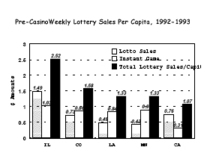When states that have non-casino forms of gambling opportunities decide to develop a casino, this decision rests on both economic and political grounds. One economist’s evaluation of a state’s gambling strategy examined the consequences of introducing casino gambling on lottery sales [1]. McGowan suggests that states risk the possibility of “cannibalization” by introducing a new product in a market segment where they already have an existing product. “Cannibalization is the deterioration of one product’s sales as a result of the introduction of another product or, conversely, the increase in sales of one product (game) at the expense of another” [2]. McGowan analyzed the lottery sales of 5 states for possible cannibalization of lottery sales after a form of casino gambling was introduced in each state. Weekly sales data for the 26 weeks before the introduction of a new form of casino gambling was compared to weekly sales data for the 26 weeks following the introduction using ARIMA analysis (Autoregressive Integrated Moving Average). In Illinois, 10 riverboats were authorized by the legislature in 1992 and mostly began operating in mid-1993. Casino gambling did not affect lotto sales or instant games. In Blackhawk, Central City, and Cripple Creek, Colorado, new casinos began operating in mid-1992. Instant game sales were not meaningfully affected by casino gambling in the long run, despite a temporary decrease following the introduction of these casinos. Casino gambling did not affect lotto sales. In Louisiana, 1991 legislation authorized 15 riverboat licenses and 1 land-based casino, which began operating for the most part by early 1993. ARIMA analysis shows that casino gambling negatively affected instant game sales but not lotto sales. In Minnesota, 11 new Indian casinos were approved and began operating by early 1993. Indian gaming had a negative impact on instant game sales but not on lotto sales. Finally, in California, 5 new Indian casinos began in mid-1993. Indian gaming did not negatively affect either instant game sales or lotto sales. In summary, most states with instant games as their primary lottery revenue experienced decreases in instant games sales as a result of introducing some form of casino gambling. Casino gambling did not affect the sale of lotto tickets. To understand the characteristics of the gambling activities which seem resistant to cannibalization is worthy of further research; these attributes may help to explain health “risky” forms of gambling. McGowan recommends that states weigh the costs and benefits of introducing casino gambling by considering the policies of neighboring states, the state’s own lottery operations, and its long-term revenue needs.
.
Source:
- McGowan, R.A. (1995). Evaluating a state’s gambling strategy: The relationship between lottery sales and casino gambling. In: R. Tannenwald, (Ed.), Casino Development: How would casinos affect New England’s Economy? Proceedings, Special Report No. 2, pp. 91-104. Boston: Federal Reserve Bank of Boston.
- McGowan, pg. 91.
This public education project is funded, in part, by The Andrews Foundation.
This fax may be copied without permission. Please cite The WAGER as the source.
For more information contact the Massachusetts Council on Compulsive Gambling,
190 High Street, Suite 6, Boston, MA 02110, U.S.





